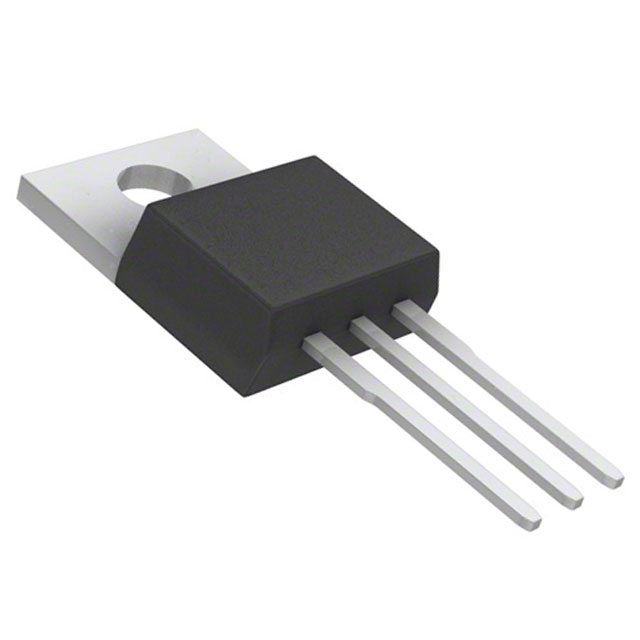AOT9N40
400V,8A N-Channel MOSFET
General Description
Product Summary
The AOT9N40 is fabricated using an advanced high
voltage MOSFET process that is designed to deliver high
levels of performance and robustness in popular AC-DC
applications.By providing low RDS(on), Ciss and Crss along
with guaranteed avalanche capability this parts can be
adopted quickly into new and existing offline power supply
designs.These parts are ideal for boost converters and
synchronous rectifiers for consumer, telecom, industrial
power supplies and LED backlighting.
VDS
500V@150℃
8A
< 0.8Ω
ID (at VGS=10V)
RDS(ON) (at VGS=10V)
100% UIS Tested
100% Rg Tested
For Halogen Free add "L" suffix to part number:
AOT9N40L
Top View
D
TO-220
G
G
D
S
S
Absolute Maximum Ratings TA=25°C unless otherwise noted
Parameter
Symbol
VDS
Drain-Source Voltage
VGS
Gate-Source Voltage
TC=25°C
Continuous Drain
Current
Pulsed Drain Current
TC=100°C
C
ID
AOT9N40
400
Units
V
±30
V
8
5
A
IDM
22
Avalanche Current C
IAR
3.2
A
Repetitive avalanche energy C
EAR
150
mJ
Single pulsed avalanche energy G
EAS
Peak diode recovery dv/dt
TC=25°C
Power Dissipation B Derate above 25oC
dv/dt
300
5
132
mJ
V/ns
W
Junction and Storage Temperature Range
Maximum lead temperature for soldering
purpose, 1/8" from case for 5 seconds
Thermal Characteristics
Parameter
A,D
Maximum Junction-to-Ambient
TJ, TSTG
1
-55 to 150
W/ C
°C
300
°C
AOT9N40
65
Units
°C/W
0.5
0.95
°C/W
°C/W
A
Maximum Case-to-sink
Maximum Junction-to-Case
Rev 0: Dec 2010
PD
TL
Symbol
RθJA
RθCS
RθJC
www.aosmd.com
o
Page 1 of 5
�AOT9N40
Electrical Characteristics (TJ=25°C unless otherwise noted)
Symbol
Parameter
Conditions
Min
ID=250µA, VGS=0V, TJ=25°C
400
Typ
Max
Units
STATIC PARAMETERS
BVDSS
Drain-Source Breakdown Voltage
BVDSS
/∆TJ
Zero Gate Voltage Drain Current
IDSS
Zero Gate Voltage Drain Current
ID=250µA, VGS=0V, TJ=150°C
500
V
ID=250µA, VGS=0V
0.4
o
V/ C
VDS=400V, VGS=0V
1
VDS=320V, TJ=125°C
10
IGSS
Gate-Body leakage current
VDS=0V, VGS=±30V
VGS(th)
RDS(ON)
Gate Threshold Voltage
Static Drain-Source On-Resistance
VDS=5V ID=250µA
VGS=10V, ID=4A
gFS
Forward Transconductance
VDS=40V, ID=4A
VSD
Diode Forward Voltage
IS=1A,VGS=0V
IS
Maximum Body-Diode Continuous Current
Maximum Body-Diode Pulsed Current
ISM
DYNAMIC PARAMETERS
Ciss
Input Capacitance
Coss
Output Capacitance
Crss
Reverse Transfer Capacitance
Rg
Gate resistance
SWITCHING PARAMETERS
Qg
Total Gate Charge
Qgs
Gate Source Charge
VGS=0V, VDS=25V, f=1MHz
VGS=0V, VDS=0V, f=1MHz
±100
3.4
µA
4
4.5
nΑ
V
0.64
0.8
Ω
1
V
8
0.75
S
8
A
22
A
500
630
760
pF
45
73
100
pF
2
5.7
9
pF
1.2
2.6
4.0
Ω
10
13.1
16
nC
VGS=10V, VDS=320V, ID=8A
3.9
nC
Qgd
Gate Drain Charge
4.8
nC
tD(on)
Turn-On DelayTime
17
ns
tr
Turn-On Rise Time
52
ns
tD(off)
Turn-Off DelayTime
25
ns
VGS=10V, VDS=200V, ID=8A,
RG=25Ω
tf
Turn-Off Fall Time
trr
Body Diode Reverse Recovery Time
IF=8A,dI/dt=100A/µs,VDS=100V
150
195
240
Qrr
Body Diode Reverse Recovery Charge IF=8A,dI/dt=100A/µs,VDS=100V
1.5
1.9
2.3
30
ns
ns
µC
A. The value of R θJA is measured with the device in a still air environment with T A =25°C.
B. The power dissipation P D is based on T J(MAX)=150°C, using junction-to-case thermal resistance, and is more useful in setting the upper dissipation
limit for cases where additional heatsinking is used.
C. Repetitive rating, pulse width limited by junction temperature T J(MAX)=150°C, Ratings are based on low frequency and duty cycles to keep initial TJ
=25°C.
D. The R θJA is the sum of the thermal impedance from junction to case R θJC and case to ambient.
E. The static characteristics in Figures 1 to 6 are obtained using
很抱歉,暂时无法提供与“AOT9N40”相匹配的价格&库存,您可以联系我们找货
免费人工找货